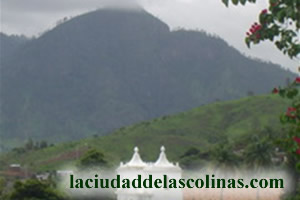By: Winston Irias Calix
A messenger of God in Catacamas
He disseminated and practiced the message of love, faith and hope, which are the essence of the doctrine of Christ. He defended indigenous rights obtaining legal titles for their lands. He punished and converted the sorcerers and students of the School of Witchcraft operating in Catacamas, which closed, warning them they were excluded from the grace of God, as expressed in the Bible in Galatians 5. He performed miracles that will build the basis for his future recognition as a saint of the Catholic Church.
These are some of the many activities that the Spanish missionary, Father Manuel de Jesus Subirana, made in Catacamas in 1860, as a part of an intensive evangelization campain, according to the story told by my great-aunt and second mother, Miss Francisca Irias Calix, to whom my sister Dilcia, due to a bad pronunciation of her name called Mi Chacha.
As told by his father, my grandfather, Mr. Antonio Irias, who met Father Subirana when that holy man was heading from Santa Maria de El Real to Catacamas, Father Subirana told the crowd that met him: “We are heading to the Catacamas Lagoon.” When they told him the town is located on land, he insisted on the name he had mentioned.
About the name Catacamas Lagoon several people say there is plenty of shallow water in the Valley of Catacamas. For decades the city had eyes of water or surface sources, such as the ones that existed in the zone of Ojo de Agua (Water Eye), which 40 years ago was a village of the municipality, just like El Hatillo is now. Both are now neighborhoods of Catacamas.
At that time a stream ran along Second Avenue in the same place the Rosmunda Herrera School was located, where now is the Municipal Library. But there’s more: the flow of the Catacamas River, which previously flowed into the Guayape, was reduced by the collapse of a hill at its source, back in 1940.
During the tragedy caused by Hurricane Mitch, bulky water jets came to the surface on the hills and slopes of Catacamas.
People in Catacamas say that missionary Subirana predicted that the city would be destroyed by the Piedra Blanca Mountain (White Stone Mountain), and that until that disaster did not happen the town of Santa Maria de El Real would never prosper.
In this regard, my aunt reassured me that Father Subirana made such fatal prediction in order to make the residents of Catacamas repent for their sins, praying every day to our Lord to keep the city safe.
Father Subirana was staying at the site once occupied by the Rosmunda Herrera School, a place I consider to be the most suitable for the operation of the Catacamas Museum, near the Municipal Library.
The School of Witchcraft reappears
My great-aunt told me that some sorcerers disobeyed the order of Father Subirana and continued their anti-Christian practices.
At the beginning of the twentieth century the Shool of Witchcraft reemerged in Catacamas, it was located at the place where now is the Juan Pablo II School (John Paul II), in Barrio La Cruz (The Cross Neibourghood). At night their “students” turned into apes and walked hand in hand through the downtown streets unto the square where now is the Central Park. They played in the leafy branches of the ceiba tree, and then returned to their place, emerging furtively, now in their human form, according to the story.
The Indian Rojas assured me that the “students” of the school turned into monkeys at a site located about 300 meters to the west of their witchcraft center, which operated in the place where now is located the Juan Pablo II School. According to tradition, in order to turn into animals the sorcerers left their souls in a gourd, which they hid with extreme caution, and in returning they would drink it, thus regaining their human form. If anyone shed the soul he or she would remain as an animal for life, according to popular belief .
But the Spanish missionary made a new miracle after his death, according to my great-aunt. The school building began to collapse and the warlocks were somehow identified by their relatives, friends and curious people. People reminded them how their ancestors had been punished and converted by Father Subirana and many of them convulsed at the mere mention of his name. Repentant, they did not exercise again their witchcraft practices.
From the book “Catacamas: Del ayer al año 2000” by Winston Irias Calix.

